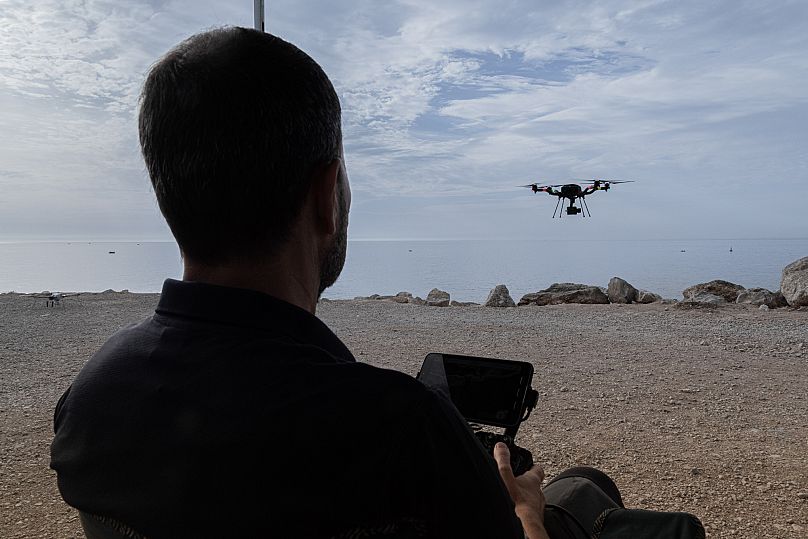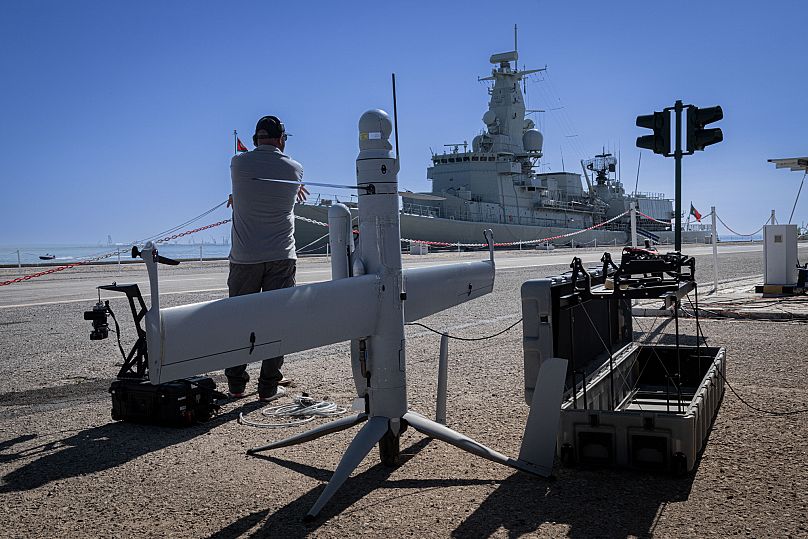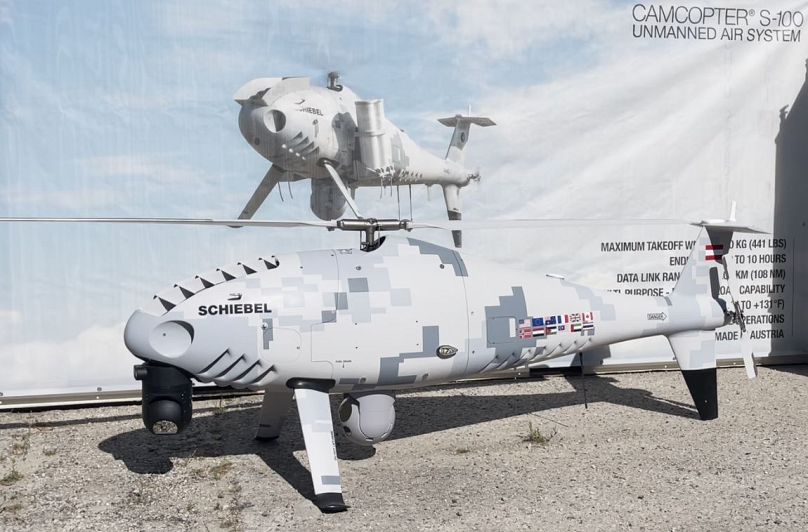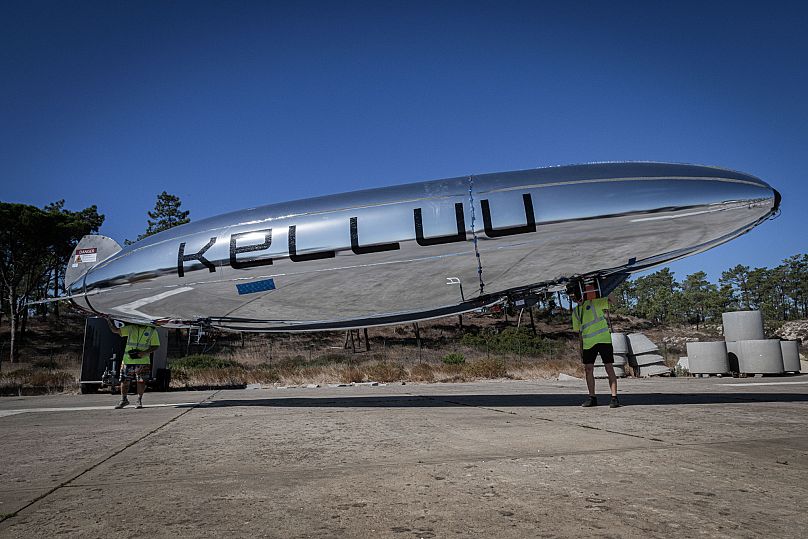NATO training and defence operations are taking on a real-time urgency as airspace violations proliferate across the EU. Euronews Next was at an annual NATO event in Portugal, where defence tech companies are being brought to the battlefield – at least for training.
Drones fly overhead and also glide underwater, and soldiers wear virtual reality (VR) headsets and monitor data from impressive-looking maps on screens. A nuclear submarine also sails off the waters of the Portuguese Navy Operational Experimentation Centre (CEOM) in Tróia.
 ADVERTISEMENT
ADVERTISEMENT
 ADVERTISEMENT
ADVERTISEMENT
This is part of a NATO-supported exercise that wrapped up this month. For three weeks, navies from 24 countries, including Ukraine, participated in the largest unmanned maritime system exercise as part of a Portugal-led military exercise, REPMUS 2025 (Robotic Experimentation and Prototyping using Maritime Unmanned Systems).
Allies were split into red and blue teams to carry out missions against each other. Ukraine, joining for the first time, was part of the adversarial red team.
Captain Valter de Bulha Almeida of the Portuguese Navy told reporters that the red team had 61 drones, 57 unmanned surface vehicles (USVs), and one unmanned ground vehicle.
Drones have been a massive part of the exercise this year, which comes as naval drones are more common in European militaries and as Norway, Estonia, Poland, Bulgaria, and Romania have been subjected to hybrid warfare in recent weeks.
One of the novelties of this year’s challenge has been the daily jamming trials to test drones in combat-like environments. Both Russia and Ukraine jam enemy drone GPS signals.
Another one of Ukraine’s battles against Russia has also been defending against drones, both surveillance and ones filled with explosives, a Ukrainian official told Euronews Next last year.
“The participation of Ukraine is very important because they bring to us the procedures and the tactics that they are doing on the frontline,” Captain Valter de Bulha Almeida of the Portuguese Navy told Euronews Next.
“We are testing a lot of techniques, procedures, and it is very important to understand each other and understand the capabilities of... all the units, all the participants in the exercise, including the Ukrainian team”.
When asked if the red or blue team was winning the simulated battle, he declined to announce a victor — but said Ukraine is providing valuable lessons as allies develop new tactics.
Captain Nuno Palmeiro Ribeiro, director of the OPEC Centre of Portugal’s Navy, said that another important teaching from Ukraine for NATO allies is learning how to do more with less.
“We have systems much more complex, much more expensive than they (Ukraine) use, and they are very efficient, so I think it's a learning lesson we have to have,” he told Euronews Next.
‘We need to test hard’
Tech companies are also learning how to work with defence and test out their offerings, one example of NATO’s ambition for allies to better integrate new technologies.
“Like Elon Musk [needs?] exploding rockets, we need to embrace risk, we need to test and plan for 20 years in the future. A lot of change has to happen,” said James Appathurai, interim managing director at NATO’s Defence Innovation Accelerator for the North Atlantic (DIANA).
“Testing centres are great but not enough, we need to test hard and we need a good testing ground,” he added in comments he made at a press conference, which Euronews Next attended.
The REPMUS exercise also pulls together academia and tech companies so they can test out their technology and work with these militaries.
European defence companies came out in droves for the exercise, which comes as the bloc boosts defence spending since US President Donald Trump took office and called on Europe to step up NATO spending.
“Until now, the [European Union’s] investment in defence sent a chill to investors; it was in the same basket as cigarettes and pornography,” Appathurai told Euronews Next.
“What we are going to see now is much more (VC) investment for defence in the EU”.
Tróia boasts a free tech zone, a 2,600 square kilometre area where companies, academics, and the military can freely experiment.
“The free tech is very important because it's an area where we can do activities that the regularity bodies usually do not allow. We can do activities which are not allowed in any other place in Portugal, and I think in other countries,” Captain Palmeiro Ribeiro said, adding that testing marine equipment in deep seas is also vital.
The technologies
The French company Akheros has been carrying out missions almost every day.
Their plug-in box can be applied to drones, which use artificial intelligence (AI) to analyse what is happening on the ground or at sea. It is nearly impossible to jam.
“As everybody knows, the war in Ukraine has changed everything. We are now entering a paradigm of asymmetric warfare everywhere, so the little drones, like ground drones or navy drones or UAVs, are very critical in this kind of warfare, and they embed more and more AI,” he told Euronews Next.
“So what we are witnessing here at REPMUS is the change of this paradigm with a new warfare which is made very agile and very fast,” he added.
Meanwhile, Germany’s RhineMetall is displaying its HERO system, a four-wing kamikaze drone.
“We can launch from 60 kilometres away and be far away from the target, putting no harm's way to the soldier in charge of the drone,” Matt McCarthy, customer success manager at UVision, a Rhinemetal partner, told Euronews Next.
“It is important to test out the technology to show our ability and our versatility to be able to be used on any platform. We have launched from land, we have launched in the air, and we've also launched from the sea, also having successful attacks and all,” he said.
He added that REPMUS was important to the company as it shows “the troops out there that it can be effective and would help them whenever they need it”.
Meanwhile, the Finnish company Kelluu has developed what looks like a blimp but operates as a drone and satellite.
It is a hydrogen-powered and hydrogen-filled airship, about 12 metres in length, that can collect data to protect critical infrastructure.
“Our company is around 100 kilometres from the Russian border. We have a lot of GPS jamming all the time,” Alex Salpani, head of operations at Kelluu, told Euronews Next.
He said that was what drove the company to develop its technology, so that it is resilient in congested environments and also in the Arctic.
To overcome jamming, he said the company uses “multiple different technologies,” but he declined to say which ones.
“We've tried multiple ones and we've found some solutions,” he said.
Testing these technologies at REPMUS is “important because the world is in a situation with multiple threats and which are causing problems to our free societies,” Luis Brito, media analyst at NATO's Allied Maritime Command, told Euronews Next.
“We need to benefit from the advances that technology innovation is bringing and move into a cutting-edge moment, because there's a lot of new systems, but these new systems always represent new situations and new challenges,” he added.














